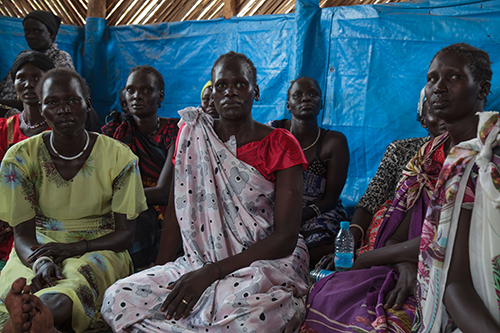JUBA, South Sudan – The famine in South Sudan, borne out of years of war, political instability and drought, now affects more than 100,000 people. UNFPA, the United Nations Population Fund, is increasingly concerned about the health and well-being of people affected by this crisis, and especially pregnant women as their food supplies are cut short.
According to United Nations estimates, in addition to the 100,000 people who already face famine in South Sudan, 1 million more people are on the brink of extreme hunger, including some 33,000 pregnant women. Up to 253,000 women of childbearing age could be harmed by the crisis this year.
“In a country that struggles with one of the world’s highest maternal mortality rates, severe hunger due to famine could increase risks during pregnancy and childbirth,” says UNFPA Country Representative Esperance Fundira. “With increases in premature or low-birth-weight babies and severe postpartum bleeding, the process of giving life becomes even more likely to result in death.”
UNFPA also expressed concern that the famine could worsen already existing conflict-related sexual and gender-based violence.

“In the South Sudanese conflict, women and girls are raped, forced into marriage and prostitution to survive. Single women, female-headed households, adolescent girls, elderly women, women with disabilities and children are at particular risk,” Ms. Fundira explains.
To help avert the terrible consequences of the conflict and famine, UNFPA supports health facilities and maternal health clinics with trained personnel to provide prenatal and postnatal care, as well as equipment and essential drugs. UNFPA also leads coordination with other UN agencies and partners for gender based violence prevention and management.
UNFPA calls for stepped up efforts to safeguard the health and protection of women and girls and ensure they have access to life-saving food, health facilities, violence prevention and response services.
UNFPA aims to raise $2 million for the health and protection needs of women and girls. The Fund also requires some $19 million to support reproductive health and gender based violence interventions under the 2017 South Sudan Humanitarian Response Plan.
***
UNFPA works to deliver a world where every pregnancy is wanted, every childbirth is safe and every young person’s potential is fulfilled.
For more information and for interview requests, please contact:
In Juba: Arlene Alano Tel: +211 954 003 844; alano@unfpa.org
In Johannesburg: Adebayo Fayoyin Tel: +27 79 517 0320; fayoyin@unfpa.org


